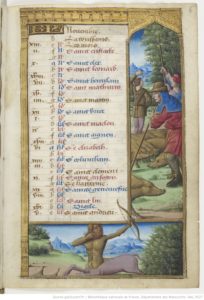
“November”, kalendar page from Les Petites Heures d’Anne de Bretagne (The Little Hours of Queen Anne of Bretagne), by the Maître des Triomphes de Pétrarque. From Bibliothèque nationale de France, Paris (France).
At the age of 33, Hilda answered the call of Bishop Aidan of Lindisfarne and established a convent in Northumbria. In 657 (at around the age of 43), she founded Whitby Abbey, becoming its first abbess. Whitby was a double monastery, meaning it accepted both men and women. They lived separately—in this case, in the Celtic style, with two or three people sharing a small house—but they worshipped together in church. Hilda was widely admired for her skills as an administrator and teacher. She consulted with kings and princes, but she also was attentive to the people in her employ: shepherds, farmers, woodcutters, and the like. In particular, she encouraged Cædmon, a herder, to accept the gifts revealed to him in a dream and to write verses in praise of God. (Cædmon’s “Hymn” is the oldest recorded Old English poem, and also one of the oldest surviving samples of Germanic alliterative verse.
Hilda’s abbey achieved great prominence in 664, when it hosted a Synod to choose a method for calculating the date of Easter. The Synod settled on the king’s preferred method, the one used in Rome. This was not universally accepted: the monks of Lindisfarne, for example, withdrew to Iona, and later to Ireland.
Hilda died on 17 November, and she is commemorated variously on the 17th, 18th, or even 19th of November.


